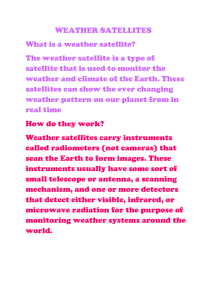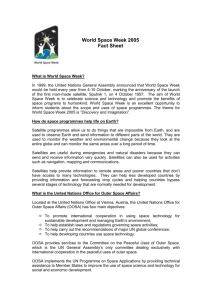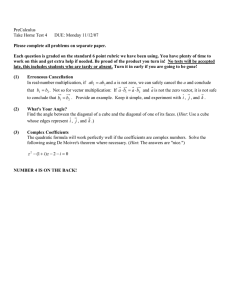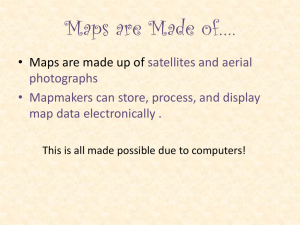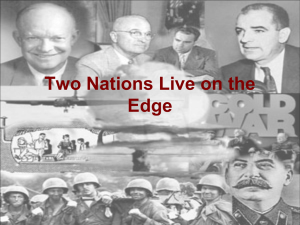7/24/63
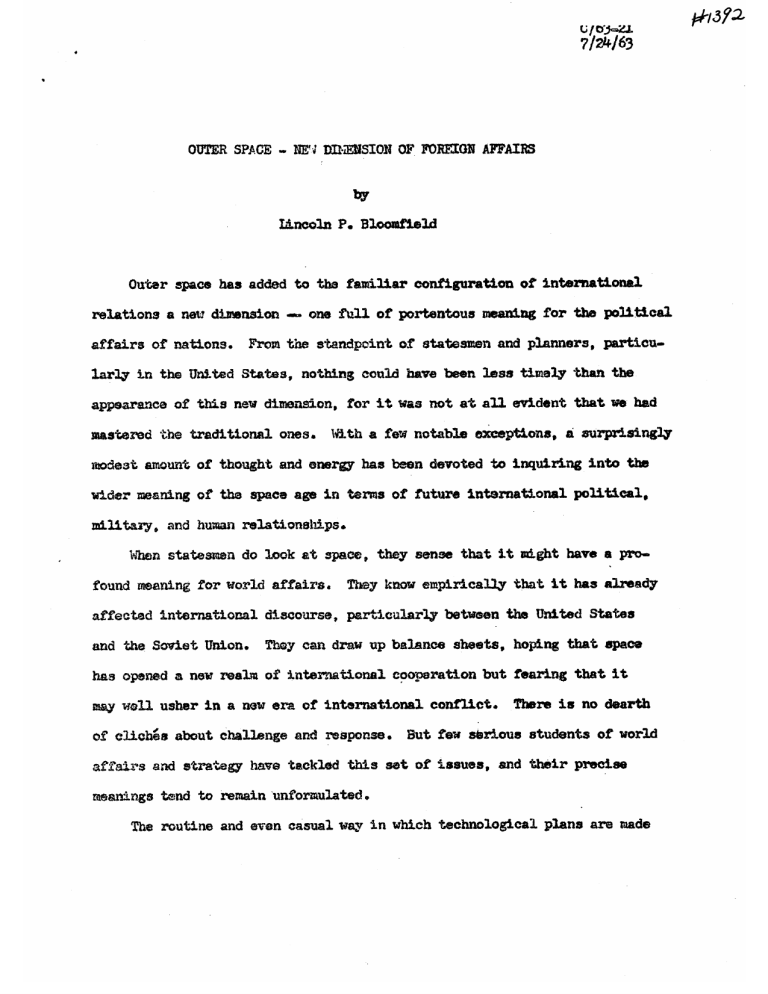
ularo-ZJ.
7/24/63
OUTER SPACE - BE' DIiENSION OF FOREON AFFAIRS
Lincoln P. Bloomfield
Outer space has added to the familiar configuration of international relations a new dimension one full of portentous meaning for the political affairs of nations. From the standpoint of statesmen and planners, particularly in the United States, nothing could have been less timely than the appearance of this new dimension, for it was not at all evident that we had mastered the traditional ones. With a few notable exceptions, a surprisingly modest amount of thought and energy has been devoted to inquiring into the wider meaning of the space age in terms of future international political, military, and human relationships.
When statesmen do look at space, they sense that it might have a profound meaning for world affairs. They know empirically that it has already affected international discourse, particularly between the United States and the Soviet Union. They can draw up balance sheets, hoping that space has opened a new realm of international cooperation but fearing that it may well usher in a new era of international conflict. There is no dearth of cliches about challenge and response. But few serious students of world affairs and strategy have tackled this set of issues, and their precise meanings tend to remain unformulated.
The routine and even casual way in which technological plans are made
2 and announced to the public indicates that, as always, the gap continues to widon between technology and political awareness. There has recently been discussion of plans for space vehicles as large as the Washington
Monument which would transport eight men in a 150-ton vault to Mars by the mid-1970's. But there has been nothing even remotely spectacular to anncunce in the political management of the space problem. In fact, the relation btwoon technology and politics is depressingly reminiscent of the iiialogou tendencm for military hardware to be developed autonomously, as it were, governed by considerations of technical feasibility and cost effectiveness, but only vory recently influencad by such longer-range "political" considerations as alliance problems, likely
ctommrunist strategy, or armcs control.
We tend still to take the onrushing of modern science as revealed truth, so to speak, that by definitior mut dorinate its political meaning.
We are coming to me that the process of politics must be invoked to clean up after science. But such is the rqstique of the scientific age that it is still unthinkable for politics to determine the goals of science or to inhibit its untrammelled development, Just as not very long ago politics was regarded as an impermissible impurity in the fighting of American wars.
The time factor alone places political planning, with its typically short-run porspectives, at a major disadvantage. At one time we could be consoled by the old lady once quoted by Dean Acheson who said, "Always rLmseber that the future comes one day at a time." But this is not wholly accurate since the future we aro talking about tends to come in quanta, as it were. We are told that the averagc lnd..-time for production of a
3 complete weapons or space system now runs in the neighborhood of eight years. The practical effect is that any one year's purposeful political decisions about technology, based as they should be on Larger strategic, political, and social considerations, will tend to be overridden by the politically mindless choices made about technology eight years back.
We can now sae awareness of this faet reflected in the design of some weapons programs, and for this we should be grateful. But when it comes to space, the common stanice is fatalistic agreement that technology will change everything and ;social values will have to take a back seat.
The interplay of technological thrust and social values increasingly enters the nationrl dialogue as people begin to take measurements of the moon shot, for example, along a yardstick marked by their own priorities.
The mocon shot could becomye an important partisan issue in the next U.S. election campaign. But like the other subjet that may animata the campaign
Cuba - it is not at all certain that the argument will be over the real issues. It is not always easy to know what the real issues are. Popular imges about the space program take their cues from the suporficial, whether in terms of now folk heroes,or of drastic and misleading revisions in popular estimates about the relative prospects of the United States and the Soviet
Union, based on marginal differences in demonstrated capabilities.
This is not to minimize either the spiritual values which space has for man or the high degree of relavanea space propaganda has in the East.
West comptition. For the firat, thV moon shot may be "asteful" but it clearly fulfilla a potent impraivin the spirit of men. For the second the USIA reports of attitudes in Western gurope and Asia were legitimats
4 factors in influencing American decision-malking about the extent of our comuitment to a space program (as well as being an unnecessarily titillating campaign issue in 1960 because foolishly suppressed). But the international politics of space have implications that go beyond the su.
perficial sensations, and if our approach is to be purposeful and intelligent it is important to try to make the international meaning of space manageable and to assimilate it into more familiar categories of foreign affairs. For space has even now a variety of meaningful implications for strategy, for alliances, for international institutions, for the health of bitterly competing societies, and indeed for the prospects of war and peace.
II.
Of all the non-.technical aspects of space, that on which perhaps the greatest amount has been written and said is the question of international law in space. International law, as the victim both of a world
struggle for power and of the utopian expectations of some of its enthusiastic votaries, has only modest gains to boast of in outer space. Indeed, if we measure it against the aspirations suggested by some, such law as applies there is minimal, shows little sign of growing in the near future, and addresses itself to matters that are trivial by contrast with the life and death issues. But at the sane time it is of great potential saliency.
Because manned exploration of space is still in its infancy and few truly damaging and prejudicial precedents have been set or claims based on squatters' rights asserted to date, outer space is believed by many to be
5 one place where law might be fruitfully developed.*
But an issue that until recently intrigued juridical minds in regard to space is, curiously, almost a dead letter today
the question of the
"boundary" between air space and outer space. The view taken by the United
States Air Force is symbolized by the label "Aerospace", with which much that once may have fallen on one side or another of that boundary is now embraoed.
Technically there is of course no boundary: the concentration of molecules of air attenuates towards infinity, with some existing in lonely isolation many thousands of miles out. Recent demonstrations of manned aircraft in powered flight in virtually the same region as the low point of an earth satellite's unpowered orbit (the X-15 attained an altitude of 67 miles in
July, 1963) make nonsense of such distinctions. In June of 1963 the Air
Force announced the award of contracts to study a piloted plane that would take off from any ground base, go into orbit, maneuver in space, and return to earth for a conventional landing. It is little wonder that neither the lawyers nor the statesmen have been able to agree upon a durable legal defie- nition of a precise boundary. But a "boundary" does exist in the sense of general acceptance of the non-sovereign character of the realm in which satellites have orbited.
Indeed, in this and a number of other respects, there is some law in space. The resolution unanimously passed by the UN General Assembly in 1961 laid down certain principles which reflected the common law, such as it was.
International law including the UN Charter, it stated, applies to outer space and the celestial bodies. Second, outer space and the celestial bodies are iSee Philip W. Quigg, "Open Skies and Open Space," Foreigm Affai OctU 1958.
6 free for exploration and use by all states in conformity with international law. Third, they are not subject to national appropriation. These principles are admitted3,y general in nature, and if the Soviets had acquired the power to preempt space they would presumably have done so. It was possible to regis-w ter this agreement on principles when it became obvious that space, like the high seas, was not controllable by- art ingle- nation. With uncomon commOn sense no nation protested on legal grounds either the passage of Sputnik over what some nations then construed as their sovereign airspace, or the route of any orbital objects since then. The Soviet Union's complaints about the
U.S. observation and reconnaisance satellite (and even at times the weather satellites) as "aggresive" have never been accompanied by charges that sovereignty has been infringed.
The Legal Subcommittee of the UN Space Cormittee which met during 1962 and 1963 was able to go only a little distance beyond these principles. There appears to be an emerging consensus with respect to the rescue and return of astronauts and space vehicles which may have to make emergency landings, and also on liability for damages one nation's satellite or space object may inflict on the territory of another. This, too, is all to the good, as is the somewhat more inchoate possibility of agreement on preventing pollution and contamination of space by means of adequate sterilizing procedures -,- a not insignificant value if at some stage it keeps the so-called advanced societies from committing on space objects or beings the medical indignities earlier perpetrated on Eskimos, Polynesians, American Indians, and doubtless others.
The polemics which characterized the mestings of the Legal Subcommittee were revealing about the nature of the underlying strategic encounter. On the
?
Soviet side they took the form of insisting that only governments can be actors in the space field - a crude barb aimed at the semi-private (or semipublic, depending upon one's angle of vision) corporation now administering the American communication satellite program. The Soviets also argued for the prohibition of war propaganda in space, whatever that may mean, and
more substantively - against permitting the use of artificial satellites for collection of intelligence a proposal that was challenged by many others who contend that observation from outside national territory is not prohibited
by customary international law.
On the United States side, our representatives have been ingenious in seek- ing to justify the reconnisance satellites.- to us a vital element in our strategic posture but to the Soviets their -nightmare come true of the "pig's snout in the bedroom" (if one may be permitted to combine several relevant
Russian proverbs). The United States has accurately
but incongruously
defended them as potentially valuable for the early spotting of forest fires, and one hopes that the Soviets privately saw the humor of this. But beneath the rhetoric and the shadow-boxing, beneath the modest albeit useful - areas of possible agreement, lay the persisting reality of the Cold War, the
Soviet struggle for strategic supremacy (or, more realistically, parity in the arms race), and the American commitment both to the prestige goals of its own space program and to the avoidance of agreement that would jeopardize the
Samoa program by indiscriminately banning all "ilitary uses." The United
States and the Soviet Union were in agreement with each other but with few others . that real controls in space must await disarmament.
8
There have been other ninimal steps toward some kind of international regime for space. One was the establishment of the U.N. Registry of space objects, a part of the 1961 American program adopted by the Assembly. Under the agreed procedure all objects placed in orbit or sent into deep space are notified by code name and other minimal and non-revelatory information to the Registry, which is available to all UN members. The United States recently accused the Soviet Union of not reporting six space shots, apparently deep space probes which failed. Our own virtue on this score is only slight-
ly diminished by the fact that it took considerable infighting within Washington before the United States itself finally agreed to report all space shots in accordance with rules we ourselves had initiated.
III.
Away from the spotlight of the UN forum some modest understandings have been reached between the two principal antagonists in space as they go through their historic m-iinuet of negotiation, stalemate, and occasional agreement. An exchange of letters between President Kennedy and Premier Khrushchev in 1961 spelled out a fairly rich menu of potential collaboration in space. But as a practical result, apart from the UN negotiations described above, only three bilateral acts of cooperation have been agreed to so far. Out of the Dryden-
Blagronravov conversations extending over the past couple of years agreement has been reported on coordinating the launching of weather satellites and ex.
changing information therefrom when the Soviets are technically in a position to do so; certain limited cooperative experiments involving passive communication satellites, with the Soviets planning to bounce radio signals off Echo II when it is orbited; and, most recently, reported agreement on coordinated
9 launchings of satellites designed to measure the earth' a magnetic field as part of the forthcoming International Year of the Quiet Sun.
The area of scientific collaboration is undoubtedly the most fruitful realm of cooperation in space today. NASA's program of bilateral agreements with other countries now includes over sixty countries. NASA has a sounding rocket program in which it has cooperated with eleven foreign countries. The weather satellite program centering around Tiros satellites has involved thirtyfive nations. Six countries - England, France, Germany, Brazil, Japan and
Italy, with others to come, have built large ground terminals for cooperative operation of the communications satellites Relay and Telstar. There are overseas tracking and communication facilities in two dozen different political areas, over half of them operated with the assistance of foreign technicians and scientists, and in some cases entirely supported by the host country. And
NASA has a personnel exchange program under which visitors have come to
American laboratories and universities from forty-five
-countries.
These praiseworthy ventures in cooperation could become outshadowed by the outcome of one foreign program. The European personality is asserting itself in space quite as much as in economic or strategic matters. The European
Launcher Development Organization and the European Space Research Organization are well underway, the former aimed at freeing western Europe entirely of further dependence on the United States for boosting European payloads into space.
Private enterprise in Europe is highly dynamic on this subject. Eurospace, which consists of 110 member corporations in nine countries, is what can only be described as a business lobby with stars in its eyes.
10
It was recently reported as having called for doubling Furopean spending for space, with a four.-year budget of over one bill.ion dollars as a
"matter of survival" survival for whom not being specified. In space communications Eurospace proposes two equatorial satellite systems which clearly could have incalculable economic and other consequences for the
American system discussed below. In the same circles there is discussion of nuclear powered systems for space vehicles, manned space shots, Mars landings in the 1970s -- in short, all the paraphernalia for a tremendously costly duplication of the American effort.
We are learning to be sympathetic to the notion that the self-respect of our increasingly muscular European partners involves values that transcend purely rational considerations of comparative advantage. It is becoming increasingly clear that western Europe has no intention of being permanentl.y
boosted into space by American rockets any more than General DeGMull intends it to be permanently boosted into the world arena by American military and diplomatic power - whatever the economic or strategic realities may appear on this side of the water. Perhaps the greatest need of the Western Alliance today, whether strategic or political, is to find an alternative mode of relationship that falls somewhere between American monopoly and complete scatteration of effort. True partnership lies somewhere between the two ex- tremes and is obviously uncommonly difficult to achieve.
In regard to space in the Western world, the American monopoly is transient, but independent and competing efforts could be nothing short of senseless. It does seem reasonable to ask whether the mounting European
1 diversion of resources and the possibly wasteful competition it augurs could have been headed off by more enlightened policies of the United
States & Such policies would have involved extensive exchanges of information and talent aimed at encouraging genuine partnership rether than a dependence marked by exclusion from the central role.
In the generally harmonious area of bilateral space collaboration other occasional sour notes are sounded, disharmonies that reverberate even in the non-governmental COSPAR (the Comittee on Space Research of the International Council of Scientific Unions) as well as in the UN Space
Committee's Technical Subcomittee. Project estforc, for one instance, raised the hackles of some otherwise staunch scientific friends of the
American space program -- as well as ill-wishers - not so much because the belt of copper filaments will necessarily obscure Sir Bernard Lovell's clear radio view of distant galaxies' it apparently will not but because.
it was done unilaterally. ,,, re serious was the lack of consultation prior to the recent high altitude nuclear bLasts, which affected people as well as signals.
The imperative need to experiment with a possibly completely secure military communication system may of course outweigh the need for advance collaboration, which after all is required only on psychological grounds of prestige, mutuality of relationship, and self,.respect. But psychology has become a prime factor in a world in which the tangibles such as military hardware exist primarily to affect the attitudes and calculations of others.
The burden of proof should rest on those who claim- that a net gain for Amrican security results from unilateral actions whether or not they irritate.
As matters stand, cooperation may lead to uncontrolled competition in space
12 within the Western world. This outcome may not be at all in the American interest and it is not too late to r-xamine the bases for cooperation.
IV.
The proposed international communication satellite system based on
Amrioai technology raises questions that differ in one major respect from tht ones I have already posed: they arc going to have to be resolved in the near future, whatever the procliviiy of government planners to postpone decisions. The United States Communication Satellite Corporation can b owned up to 20 xer cent by foreign interests. It has on its agenda rigsht now a list of unresolved questions concerning foreign participation in the maintenance, operation, and ownership of the satellites, ground stations, and tracking network; sharing of revenues; attitudes toward uneconomic but politically desirable operations; and the regulation and control of the system itself.
It is argued by soma that this is a purely business operation, in which pr.
marily commercial considerations ought to predominate. The same argument asserts that, since satel1ite comunications are "poinit.-to-point" today, those who persist in warning of profound pltical and psychological implications in the technology are silly -isionaries. It holde' that the U.S. approach to the range of issues rAsed ty the -bility to transmit international comunications by satellite should be essentially conservative, above all governed
by the technology, and fundamentally consistent with practicos followed in the past with respect to communications by cable. It is popular in this arguwnt to cite the good relations over the years between tochnical repreesntatives of the Amrican Telephone comipanies and the British Post Office.
2.3
Admittedly, in 1963 the state of the art requires that messages, television programs, and news, even though bounced off orbiting satellites, be handled by national centers for distribution at their discretion. There is nothing revolutionary about that, in the sense of new pathways to paople'sa minds, unprecedented opportunities for propaganda, or reassive assaults on illiteracy and cultural isolation. But planning that does not go beyond this year is unworthy of its tru purpose. We have been taken by surprise often enough by technology to give at least oe crcdence to those who look beyond todey's capabilities to those of tomorrow and the day after, when telphone calls to anywhere in the world
mny cost pennies, when three synchronous hovering equatorial satellites will beasn IV programs -not to governmerit-controlled centers but directly into virtually all the homeas in the civilized world, completa with multiple-selector language channela: in short, when the extrapolations of today's technology alter - as they sur-el1y will traditiona)l patterns of comunication in ways not now foreseoable. Se%: breakthroughs may coms the year after next; some iltake oreroa decade. But because of them the world as we know it will no longer be the same, and the charge on planning today to anticipate the now world is an exigent on,.
No one pretends the policy answers are easy to come by. We are obviously athwart the horns of a dilora; if we act precipitately now to fix basic patterns of international regulation, of control, of ownership, they may be outmoded in a few short years. The conservatives are right when they point out the ex;tent of- our ignorance, and no one would argue that we know enough now to nct ..ith finality; already the
14 satellite technology is feeding back, so to speak, to stimulate breakthroughs in transistorized trans-oceanic cables, a development that could drastically altor the comparative cost estimates which were one of the chief stimuli to communication satellites in the first place.
But on the other hand if we wait until all the changes have taken
place, we shall obviously never be ready to impose constructive statesmansbip on a vital social devolopment. Onecan go further and argue, no doubt heretically, that it might not be wholly irrational to fix the political and social objctives we ish to serve with communication vatellite technology, and design and produce the hardware accordingly.
Such a point of view is it iU clear; quite out of keeping with the worship of autonoimously-developing science and technology for its m sake.-a philosophy that could ond in annihilating its masters.
Short of a reversal in the conventional science-politics equation, surely we can improve our procedures for cranking into the process a greater degre of political purposefulness and direction. The conclusive argument for drastically broadetning the prccesses of national planning and decision-making about the future contours of apace communication is that the relevant factors by their ver7 nature go beyond the technical and bureaucratic, beyond the combination off changing technology and narrow agancy partisanship that tend to stymie and frustrate attempts to impose imnaginative political approaches on the development of an intornational satellitz system. The rolevant fators obviously include ideological and even aesthetic eonsideirations that it io neither wise nor fair to leave either to NASA or to the US Air Force, the Federal
15
Communications Coranission or,one night arguwto the Board of Directors of a basical2y profit-seking Corporation. The State Department, because of its particular mandate, comes closest among government agencies to having a sense of the larger national interest in the international scheme
of things. But the State Department has not been playing the dominant role in this matter, whether by choice, necessity, or default.
The feeling is inescapable that on this range of pressing and complex issues the United States government stands in need of some fresh, broad.
gauged advice from bothCongress and from leaders outside of government.
The advice is neoded both to help sort out the primary values that are at stakq and also to help supply the necessary political courage for moving ahead with an international political and administrative design appropriate to even a changing technology. Such a high-level and widely-
basod reappraisal would consider such specific matters as whether the
United States should favor the creation of a truly international communication, satellite sjstm involving genuine partnership with other govern.
ments and nations, whether it should press for a new international organization for the purpose or rely on the slightly -- but only slightly - renascent International Telecommunications Union; whether the logislation establishing the Corporation, and passod over such passionate opposition in the Senate in August of 1962, should be looked at afresh with a view to making the Corporation more of an instrument of overall national policy; th-i.S. program as. a wholeAshould be broadened toward real partnership with
Oui allies andimore imaginative institubon.-building in the U.N.g whether the distributiori of American cultural fare should be better geared 'with-t
16 the attendant danger of producing a misplaced and even trivial emaphasis for the whole enterprise, featuring the worst we have to offer rather than the best.
These questions and many more have of course been raised, and some
of them are going to be decided by those who are assigned responsibility within U.S. governent aganeies and within the Satellite Corporation.
Othcrs will not be raiad at all; still others ill be put on the shelf.
Perhaps the only way to serve the broader national interest is neither to place impossible burdens of policy.-makers at subordinate levels nor to, expect detailed attention to non-vital' questions from topside, but rather to find some new aians of assisting the process with powerful and impar.
tial help and advice on the matter from the Congress and leaders among tlhi national public. The Presidenti.l study commission ha too often been used as an sca ro &cisiop makin83 but in this case it could
be the needful handaipden of responsibility.
V.
Inescapably the question about outer space of the greatest portent for foreign affairs is the possible military use of that realm. The possibility of weapons of great dstructiveness being placed in space is among the most alrming prospacts currently anticipated and the one which arouses the most legitimate concern among military planners. But it is an argument full of am-biguity. At this writing responsible strategists seem to agree that there is no present mrission for spaco-based weapons that cannot be better handled on earth. This is to say that an orbiting bombardment satellite, for all its psychological sere value and even
17 its potential military vnlue, is a less protected, less invulnerable, more provocative and therefore generally less efficient weapon than ono buried inderground in a silor or capable of firing from unknown locations at sea. But it is the future that most concerns the aerospace planers, £'dr these .argwsnts could be reversed by technology.
Th technical arguments for developing space weapons should concern us less hero than tho political roasoning. But civilian planners, even when they have heard the arguments about the relative merits of the orbiting bombardment satellite, cannot afford not to know that scientists can foresee the development of even more advanced space weapons systems such as the neutron-flux weapon, or laser-directed nuclear energy force reducing present warning timas to approximatel]y one second, plasma jets heated to millions of degrees into a real fourth state of matter, ionized gases directed by rAdio at great velocity, and others even more exaotic and alarming. Some of these aro in the distance. But decisions taken now to develop .-- or not to develop
a weapons system to ia ,dbgre.
tonstrain
the politicalenvironment -eight years hence.
It is no simple ratter to draw Ines between military and non.
military uses of space. Civilian and military uses of space spring from common scientific roota; tho applied technology itself can take dual forms.
It L not particularly clear what is oven meant today by "military uses" of space. To the Tnited *tates the notion of a Soviet bombardment satelite in orbit overhoad, possibly fitted out with a dramatically winking light accompanied by earthly mesage drawing appropriate parallols to the Sword of Damocles, could create psychological- and therofore
is political -- havoc. While its rilitary value might be loss than that of
a fleet of Polaris-firing submarinea at sea, the greatest danger of Soviet weaponry in space could be the stimulation of a now spiral of weapons development, which could in turn lead to truly efficient uses of space for warfare.
In part doubtless to influence Soviet decision-making, authoritative statements by the President and responsible officials of the Defense
Dec= partment have in recent months announced time and again that no useful military mission l foreseen in spmee by the United States at this time, and that, while investing prudntially in research, therc is no present intention of placing weapons in space In fact. it might be less alaming to our opponent if we did just that rather than what in fact we have done.
The U.S. observation and reconnaissance satellite is, according to public accounts, photographing the Soviet Union from orbital heights.
The political effect was predictable and may in some ways have been as profound as offects we right anticipate for a "Rod Bomb"' over Washington. If the greatest military asset the Soviet Union has today is socracy, the Samos
Eatollite is a threat of th highest order, and by that token a great
U.S. strategic asset.
These varying approaches taken to space as an international problem, each approach based on estimnates of the vulnerabilitios of the other side, whether military or political, have given a rough symmetry to the debate.
One curious and paradoxical consequance is that the United States and the
Soviet Union have been driven by the logic of their own strategic concepts to the position of standing together in the United Nations Space Committee,
19 in opposition to virtually all other states who favor limiting space =ow to
"peaceful uses on23." The United States of course sincerely deems Samos to be a peaceful use of space since it is not a weapon and, in any event, helps to preserve the peace by offsetting the lack of parity in targeting information available to both sides. According to good ams control doc.
trine it should even be reassuring to the Soviet Union to know that we are reassured (although bargaining theory does not always have the desired policy effect). The Soviets, for their part, consider that any "socialist weapons" are weapons of peace. The semantic struggle between the two vocabularies faithfully reflects the profound lack of understanding at the political level.
One immediate policy consequence of the ambiguities and uncertainties about militarizing space is the increasing agitation, both inside and outside the armed services, for a greater militar7 voice in the American space program. The mounting campaign for a larger Air Force role in the space program represents at least in part the professional' s fear of obsolescence -- even, at its worst, the vested interests against which General Eisenhower
warned in his Presidential valedictory. But behind it is an intuition no responsible person can ignore that whatever the present equation of cost effectiveness, it is likely that the Soviet Union, given the highly secret nature of its space program harnessed to its drive for strategic supremacy, is developing space weapons. There is some recent evidence for this.
To some who hold an extreme position on this matter it follows that
NASA
... the National Aeronautics and Space Administration -- should be turned over to the Pentagon. Others reflect understandable unease that
20 somehow we might be caught short in dividing our attentions so scrupulously between civilian and military purposes in a race with a power whose space program is very likely military in organization, operation, and, at least arguably, motivation. President Kennecy has resisted the ex- tremist pressure, as did President Eisenhower. Unfortunately, however, lesser statesmen may view it as a valuable partisan issue, far more than criticism of the moon shot, as I suggested earlier. This could be highly tendentious, possibly misleading, even dangerous.
The central point is that two complementary assets for the United
States are involved, one strategic and the other political; it would be sen3eless to sacrifice either one without oxtraordinarily good reasons for doing so. The strategic assot rests on the axiom that one's own weapons can meaningfully affect the other side's mischevious calculations.
Concretely it lies in the continued provision of both resources and oncouragement for ressarch and development on-, military missions which cannot now be foreseen in any detail but which nevertheless must be provided for unless and until a reliable arms control agreement in outer space can be worked out. Responsible government officials have given constant assurance that adequate resources are being devoted to this purpose.
In-.
deed, it is not difficult to make appropriate connections: the astronauts are Air Force pilots; the joint NASA-Air Force programs for manned space flight, including techniques for rendezvousing and docking in space and for landing on the moon, all have potontial military value, whether for capacity to intercept and distroy htIle objects in space or for the possible capacity for a disarmament orgnization to uidertake inspection
end search - and, if necessary, destruction -- of hostile objects.
The political asset is the primari3l civilian cast of the American space program. Such evidence as testimony by organs of public opinion throughout the world when the United States launches manned space vehicles suggests that this asset has continued high value. The legislative history of NASA, like that of the U.S. Atomic Energy Comission, reflects a basic
American preference for a predominantly civilian lead in the space program while paying the necessary attention to military requirements. There seems no sensible reason deliberate3y to distort the image thus created and to destroy a valuable political asset by capitulating to the extremist position of out.and-out militarism in space.
As for arms control, there are few signs that disarmament in space, in the sense of inspecting launching pads and payloads, or even agreeing on what is an unacceptable use, is likely completely apart from other forms of disarmament on earth. But at the sae time the space arms race could come to look increasingly expensive and perhaps not very profitable strategically.
Premier Khrushchev said in late June 1963 that the extension of the arms race into space would endanger the world. Westerners believe this too, but there has been no concrete proposal that seems to avoid the pitfalls that beset over.-all arms control negotiations. Khrushchevian rhetoric urging the transformation of space into a "zone of peace and a zone of international cooperation," and American Presidential appeals along the same line, need a- special kind of push to give them, as it were, escape velocity sufficient to break out of their still solid place in the web of conflict. Perhaps matters
22 have to get considerably worse, in the sense of less theoretical and more concretely menacing, or considerably better, in the sense of other
Get agreements following the test ban - to supply that liberating thrust.
None of this relieves us from acting on the premise that, if arms control in space is desirable, som may be possible. I am aware of arguments, some
highly respectable,. to the effect that space weapons might be stabilising and even conducive to arms control, and others uggsting that human conflict might be transferred to space, as a kind of William Jamesian moral equivalent to war on earth, a surrogate for the obviously worse kind of combat involving people. But given the universal and all-pervasive nature of the issue betweent
East and West, whose battles may be moderating but whose end we cannot safely predict, too many earth values are at stake to safely plan for a limited war fought between gladiatorial machines at a comfortable remove from hearth and home. Thus in my view we are not excused from trying to prevent a hot war in outer space any more than we are in inner space.
VI*
One emerges from this brief tour of the horizon in the international space field with several propositions. First, and most platitudinously, technology continues to race way ahead of political knowledge and judgment.
Better ways need to be found to enlarge the base of American planning and decision-making, to involve national leadership in the great issues only now
*See T.C. Schelling, "The Military Use of Outer Space; Bombardment Satellites," in Outer Space in World Polities, ed. J.M. Goldsen, Praeger, 1963.
0
23 shaping up, and to illuminate the public debate with the right questions.
Second, if the United States does not take greater risks in formulating its own preferred long-range design for the international space program, with real detail and strategic precision and not only in broad platitudes and vague hopes for peace and cooperation, we can be certain that others will
fix the design for us, faithful to Edmund Burke's warning that "all that is required for the forces of evil to win is for good men to do nothing."
Third, it is unlikely that we can evolve final solutions for the problems of space control independently of the problems here on the earth's surface.
More precisely, the Cold War in outer space will undoubtedly last as long as it does in inner space.
But, fourth, arms control in space is a relevant problem. This argues for the desirability of pressing towards limited arms control agreements regarding outer space. These may not be out of the question despite the axiom that links both realms to a unified political-strategic struggle.
It also argues for avoiding in every way possible an aCcelerated "qualitative" arms race in which new technologies produce a spiral that students of arms races in history assure us is far more dangerous than the purel,y numerical kind of arms ompetition.
Fifth, the danger of the self-fulfilling prophecy exists no less in space than anywhere else. For the United States overtly and explicitly to militarize its over-all space effort, as a number of self-styled "hardliners" would have us do, could bring about the very outcome which American policy has worked so hard to prevent.
Sixth and finally, the space age is going to alter traditional patterns of international relations and old ways of thinking about the world outside our national boundaries just as surely as the creation of a universal religion, combined with the building of roads, destroyed the parochial medieval patterns of town and fief. One boggles at exact prediction, and it is not yet certain even what the correct political and philosophical questions are to ask.. The logic of increasingly blurred national boundaries in the light of expanding space frontiers leads one man to call for world government now, another to plead for a return to homely local values we can cling to in the face of change, and a third to bury his head in the sand and ignore the whole frustrating, unsettling, even frightening enterprise.
Perhaps Friedrich Nietzsche, for all his wrong-headedness, had a prevision of our world, posing the question of questions that we may ultimately have to answer about our forms of political organization and our sense of human brotherhood when, almost a century ago, he wrote: "Inescapable, hesitatingly, terrible like fate, the great task and question approaches: how should the earth as a whole be administered? To what end should man as a whole -. no longer a people or a race - be raised and bred?"
Things happen in their own good time, and when human penetration of the cosmos has transformed and broadened human attitudes to the point of such acute self-awareness, doubtless we will know it. But while the forces making for change are at work, the tasks of the scholar and the statesman alike are to anticipate, to plan, and so to reconcile the fruits of science and political institutions as to preserve and enhance the values that matter to man himself.
